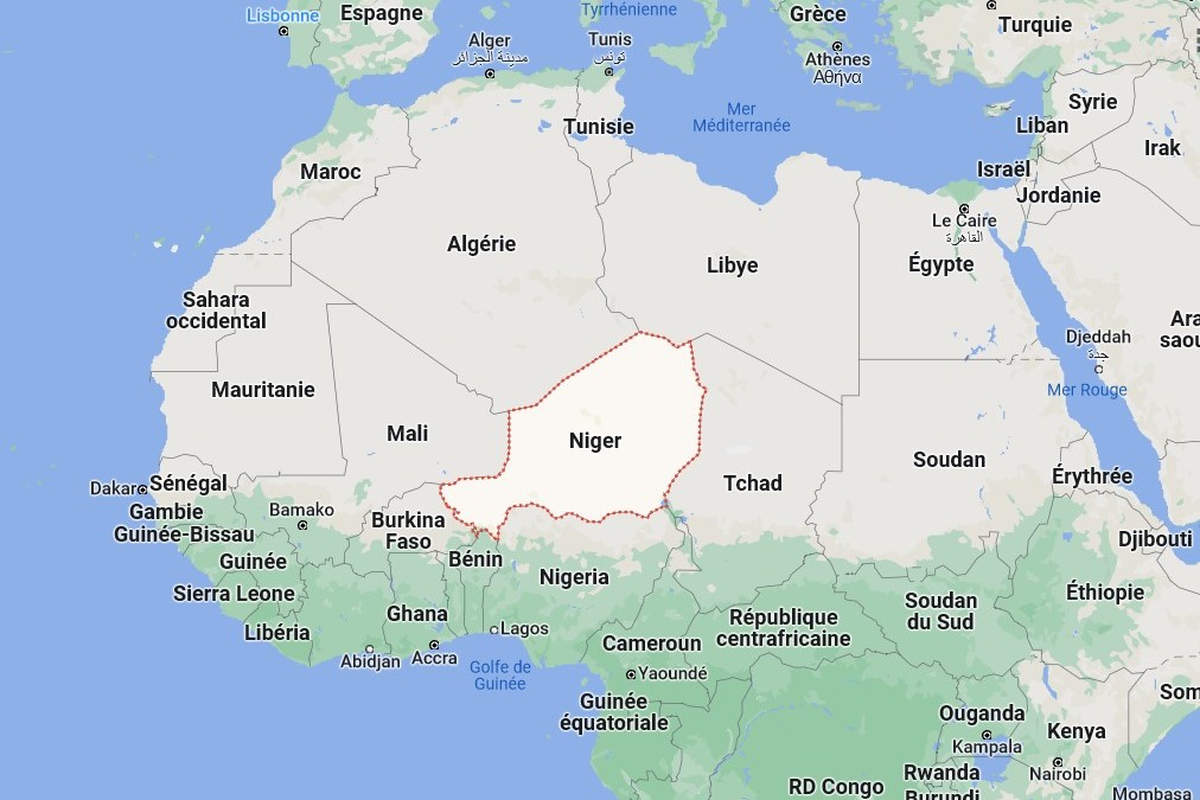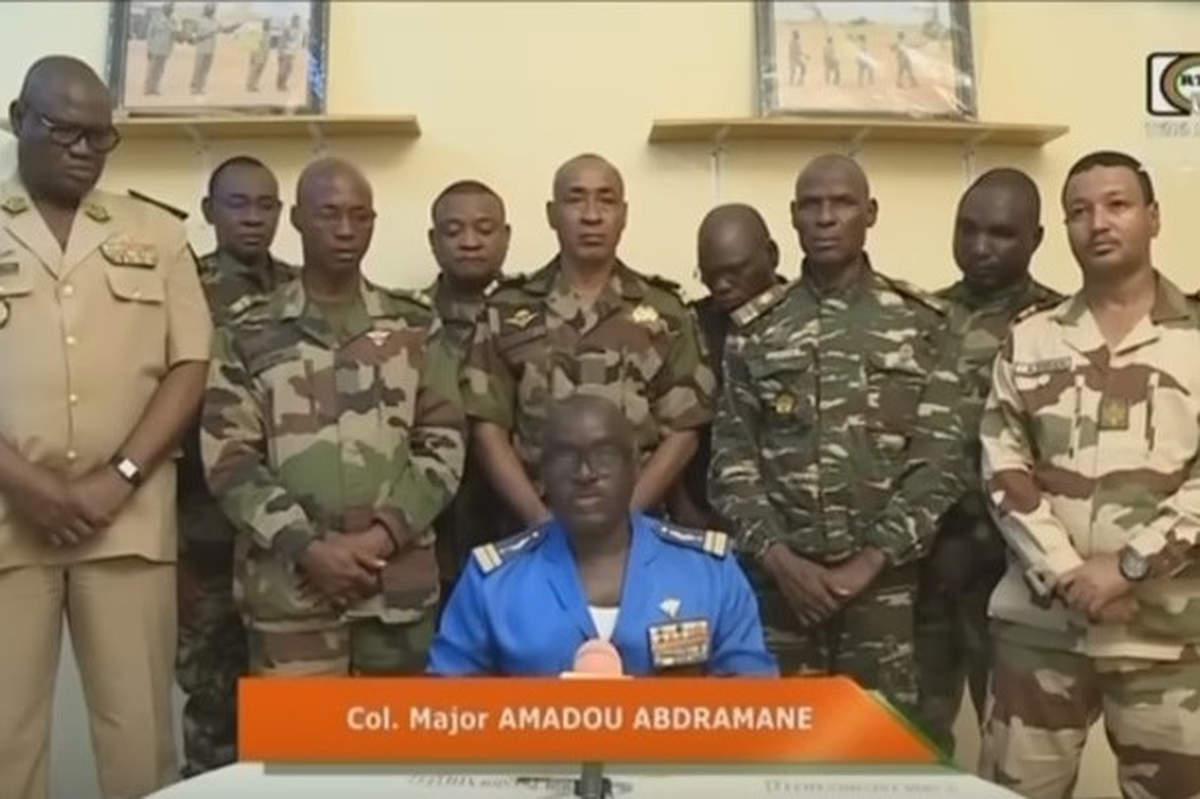The ECOWAS ultimatum expired last night at midnight. The junta and the population are now expecting military intervention. Niger has closed its airspace and claims that two Central African countries have deployed troops. This suggests that France is organizing from its bases in Gabon and Chad. The situation is extremely dangerous for the whole of the Sahel. Read Leslie Varenne’s excellent analysis in Ivéris below.
Niger: from palace revolution to world stage

The events that have been unfolding in Niamey over the past week are dizzying. If the situation were not so threatening, it would be comical. How could we have gone from a highly predictable Niger-Nigerian coup to a Cold War episode in the space of a few hours, with the potential to set Niger and the whole of West Africa ablaze? It’s a cocktail of blindness, analytical errors, self-fulfilling prophecies and emotions over reason.
Putting an end to the fable…
First and foremost, to understand the current situation, we need to put an end to the fable of “Niger as an example of democracy”. No, the 2021 presidential election was not free, credible and transparent. It was a transfer of power between former President Mahamadou Issoufou, who could not stand for a third term, and his ally and friend of 30 years, Mohamed Bazoum. Condemning the coup is one thing, repeating like a mantra that “the democratically elected president” must be reinstated is quite another. Not only does this formula irritate Nigeriens, who consider this election to be the most fraudulent in the country’s history, but it also fails to provide solutions to the crisis. How can we find the right answers based on a false premise?
The ex in ambush
The second element is the weakness of the President, currently held back by the CNSP (Conseil national pour la sauvegarde de la patrie, a body created by the ruling military). Throughout his two years at the head of the country, he has never really been able to establish his authority. Mahamadou Issoufou pulled all the strings and remained unavoidable. As proof of this, no foreign leader ever visited Niamey without passing through the ex’s residence. If the junta enjoys an unction among the population, especially in Niamey, it’s not so much because of Mohamed Bazoum, who has made himself popular, as because of the massive rejection of the former President and the PNDS system, the ruling party that has held the country hostage for over a decade.
What role did Mahamadou Issoufou play in the coup? His proximity to General Tchaini, head of the Presidential Guard, author of the coup and Niger’s new strongman, legitimately aroused suspicion. The scenario according to which Abdourahamane Tchiani acted on behalf of the former President, then betrayed him under threat from the rest of the army, is the most commonly accepted by those who follow Niger closely. Mondafrique has described the hypotheses circulating as to the reasons for the betrayal by the former President, the friend of 30 years: Mohamed Bazoum’s desire for independence; his involvement in the uranium gate which closed the doors to the post of Secretary General of the United Nations which he coveted; the desire to keep a firm grip on business.
Another crucial element is never mentioned: Niger’s oil. The pipeline between Niger and Benin, which should be operational in the coming weeks, is a major turning point for the country’s economy. Niamey is poised to become a bigger exporter of black gold than Malabo. It’s no coincidence that Sani Mahamadou, the son now incarcerated by the CNSP, was wisely appointed Oil Minister in the last government. The stakes are much higher than the much-discussed uranium, which is of no strategic importance to either France or the European Union. Niger is the fifth-largest supplier, far behind Kazakhstan and Canada.
Blindness
From the outset, it was a palace revolution in Niger that none of Niger’s partners had anticipated. According to Le Canard enchaîné, at the last Defense Council, Emmanuel Macron was furious with the head of the DGSE: “Niger after Mali, that’s a lot”. Rest assured, the Americans, who have over 1,000 men on the ground in Agadez at their largest drone base, in Niamey and at their CIA base in Dirkou in the north of the country, didn’t see this coming either. Nor did the Italians and Germans, who also have troops on the ground. Yet it was predictable, as researcher Rhamane Idrissa writes: “In Niger, a coup d’état is not a surprise, but a statistical probability.” For every four successful coups in its history, how many have failed? The latest took place on the eve of Mohamed Bazoum’s investiture. How then can we understand this blindness? The answer: a fable. How could a putsch be envisaged in a country that “is an example of democracy”? How could Mahamadou Issoufou, winner of the Mo Ibrahim Prize for good governance, be suspected?
Another element of the answer is the professionalism of the coup leaders, who were trained at the right school. Like Salaou Barmou, head of Niger’s special forces, who wiped his uniform on the benches of the National Defense University in Washington and who only last month was talking to the head of the US Army’s Special Operations Command in Agadez.
The khaki international and fear of the Bear
The July 26 coup d’état had an unanticipated staggering effect on Niger’s partners. The cumulative effect – there have been five coups d’état in West Africa in less than three years (two in Mali, two in Burkina Faso and one in Guinea) – also exasperated them. The fear of seeing a “khaki international” take hold in the region also played a role. But their greatest apprehension was a repeat of the Malian scenario: the arrival of Russia on Nigerian soil, with the consequent departure of their forces. It doesn’t matter that the coup was carried out in Niger without Russian involvement, and that Moscow condemned it. The anguish remains. The scenario is politically nightmarish for Emmanuel Macron after the humiliations he suffered in Burkina Faso and Mali. The Americans also have a lot to lose. Strategically, the area is important: they have invested hundreds of millions in their bases in Niger, which enable them to control part of the region, and above all Libya. For the moment, Washington has been careful not to declare the coup d’état, as such a legal qualification would force them to leave.
Martial posture
The responses matched their anxieties. Under cover of ECOWAS, the Americans and the French pushed for the toughest sanctions since those imposed in Côte d’Ivoire in 2010. The fact that this state is one of the poorest in the world, and that its population is the first victim, is of little importance. Nor does it matter that, as in Mali, these measures are counterproductive, giving the military a victimized argument for national unity. Alongside Alassane Ouattara, the new Nigerian President, Bola Tinubu, who holds the presidency of the sub-regional organization for this year, is spearheading the hard-line camp. Abuja, which supplies 70% of Niger’s electricity, has disconnected its high-voltage line. In retaliation, the CNSP cut the power to Mohamed Bazoum’s villa. Nigeriens, for their part, will be little affected: according to World Bank data, only 21% of the population has access to electricity!
But the hardest part is yet to come. ECOWAS has given the CNSP one week to reinstate the “democratically elected President” Mohamed Bazoum, and is threatening military intervention. The organization’s chiefs of staff met in Abuja. At the end of their conclave, one official declared that such intervention “would be the last option on the table”. However, it seems that everyone is planning the intervention even before the end of the ECOWAS negotiations and the ultimatum date. According to a tweet by journalist Georges Malbrunot: “French forces have been put on alert in Côte d’Ivoire, Chad and Djibouti.” For its part, through the voice of its Secretary of State, Washington clearly warned the CNSP should it refuse to return to the barracks, and Catherine Colonna asserted “her unity of views with Antony Blinken”. In consultation with the Nigerian army, France repatriated its nationals and any Europeans who wished to leave the country. At the same time, the United States ordered the evacuation of its non-essential personnel. Is this a sign of the conflict to come? The direction of this military intervention would be taken by the Nigerian army, with Paris, Washington and the European Union in support.
The cataclysm
At a time when Sudan has been facing a devastating conflict since May 15, and Chad is suffering the serious consequences, a new war is just what the continent needs!
How can we fail to appreciate the absurdity of the situation? ECOWAS and its allies are going to open fire on a country already at war on two fronts, Boko Haram in the southeast and the Islamic State in the Tri-borders. They will therefore be waging war on their brothers-in-arms, whom they support in the fight against terrorism. Moreover, Nigeriens and Nigerians are fighting together against Boko Haram. As a bonus, at the first shot, Mohamed Bazoum’s life will be threatened, so there will be no “democratically elected President” to put back on the throne. What’s more, wouldn’t it be odd, to say the least, to use the lethal weapon for a putsch potentially fomented by one of their best allies, former President Mahamadou Issoufou?
Finally, the conflict will become internationalized. Algeria and Russia are on the same wavelength, both denouncing the coup but viscerally opposed to military intervention. On August 2, the Algerian Chief of Staff, Saïd Chanegrina, visited Russia, and Moscow underlined Algiers’ role in regional security.
Should military intervention actually take place – the worst is never certain – the explosion would be major. African public opinion will not accept a new war waged by the West, even if it is waged under the umbrella of ECOWAS. As a reminder, the 2011 wars in Côte d’Ivoire and Libya marked the beginning of a massive rejection of French policy. A new one would eject Paris from the Continent for decades to come. What’s more, in the current context of West Africa, it would be an earthquake, setting the whole sub-region ablaze, with terrible consequences for civilians. Not to mention the risk that this destabilization could benefit the jihadists, or even… that Russia could be called in to help! We’ve come full circle…
Leslie Varenne
Director, Institut de veille et d’étude des relations internationales et stratégiques

